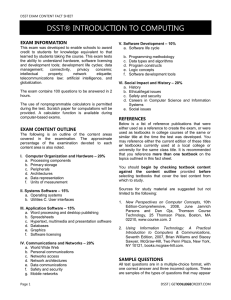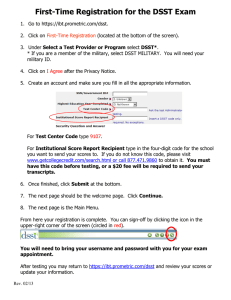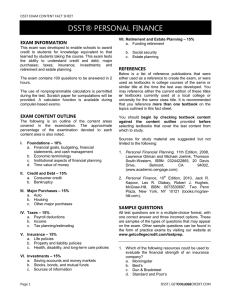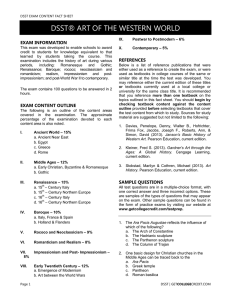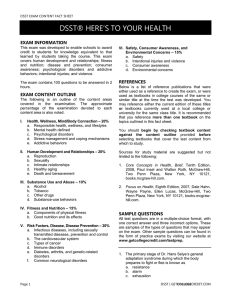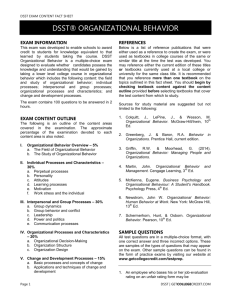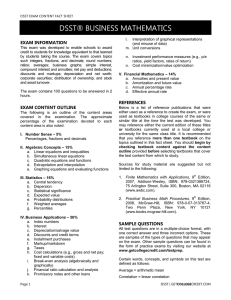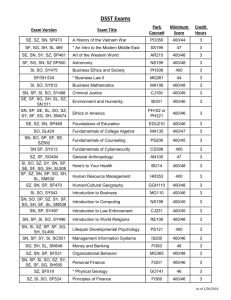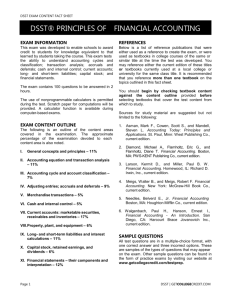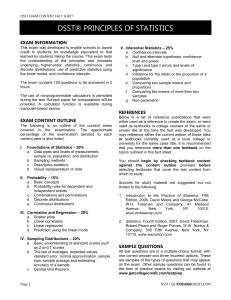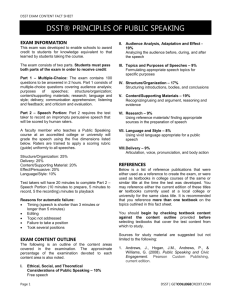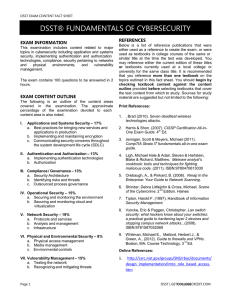DSST® PRINCIPLES OF SUPERVISION EXAM INFORMATION
advertisement
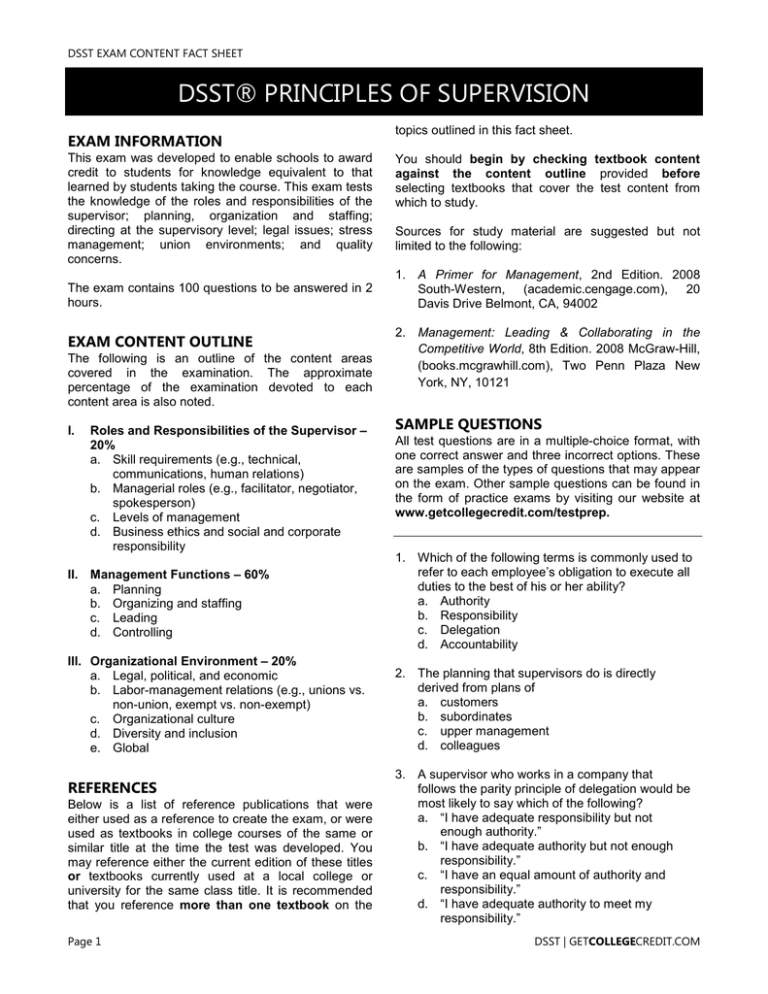
DSST EXAM CONTENT FACT SHEET DSST® PRINCIPLES OF SUPERVISION EXAM INFORMATION topics outlined in this fact sheet. This exam was developed to enable schools to award credit to students for knowledge equivalent to that learned by students taking the course. This exam tests the knowledge of the roles and responsibilities of the supervisor; planning, organization and staffing; directing at the supervisory level; legal issues; stress management; union environments; and quality concerns. You should begin by checking textbook content against the content outline provided before selecting textbooks that cover the test content from which to study. The exam contains 100 questions to be answered in 2 hours. EXAM CONTENT OUTLINE The following is an outline of the content areas covered in the examination. The approximate percentage of the examination devoted to each content area is also noted. I. Roles and Responsibilities of the Supervisor – 20% a. Skill requirements (e.g., technical, communications, human relations) b. Managerial roles (e.g., facilitator, negotiator, spokesperson) c. Levels of management d. Business ethics and social and corporate responsibility Sources for study material are suggested but not limited to the following: 1. A Primer for Management, 2nd Edition. 2008 South-Western, (academic.cengage.com), 20 Davis Drive Belmont, CA, 94002 2. Management: Leading & Collaborating in the Competitive World, 8th Edition. 2008 McGraw-Hill, (books.mcgrawhill.com), Two Penn Plaza New York, NY, 10121 SAMPLE QUESTIONS All test questions are in a multiple-choice format, with one correct answer and three incorrect options. These are samples of the types of questions that may appear on the exam. Other sample questions can be found in the form of practice exams by visiting our website at www.getcollegecredit.com/testprep. II. Management Functions – 60% a. Planning b. Organizing and staffing c. Leading d. Controlling 1. Which of the following terms is commonly used to refer to each employee’s obligation to execute all duties to the best of his or her ability? a. Authority b. Responsibility c. Delegation d. Accountability III. Organizational Environment – 20% a. Legal, political, and economic b. Labor-management relations (e.g., unions vs. non-union, exempt vs. non-exempt) c. Organizational culture d. Diversity and inclusion e. Global 2. The planning that supervisors do is directly derived from plans of a. customers b. subordinates c. upper management d. colleagues REFERENCES Below is a list of reference publications that were either used as a reference to create the exam, or were used as textbooks in college courses of the same or similar title at the time the test was developed. You may reference either the current edition of these titles or textbooks currently used at a local college or university for the same class title. It is recommended that you reference more than one textbook on the Page 1 3. A supervisor who works in a company that follows the parity principle of delegation would be most likely to say which of the following? a. “I have adequate responsibility but not enough authority.” b. “I have adequate authority but not enough responsibility.” c. “I have an equal amount of authority and responsibility.” d. “I have adequate authority to meet my responsibility.” DSST | GETCOLLEGECREDIT.COM DSST EXAM CONTENT FACT SHEET – PRINCIPLES OF SUPERVISION 4. Which of the following is an example of a line employee? a. An industrial engineer b. A salesperson c. A security guard d. A manufacturing department foreman 5. Employee counseling is usually NOT appropriate for addressing an employee's a. marital problems b. substance abuse c. career planning d. preretirement planning 6. When a prospective employee is being interviewed, which of the following questions CANNOT be asked? a. "Do you have any training that qualifies you for this job?" b. "Do you have any relatives working for this company?" c. "What is your marital status?" d. "Are you in this country on a visa that permits you to work?" CREDIT RECOMMENDATIONS The American Council on Education’s College Credit Recommendation Service (ACE CREDIT) has evaluated the DSST test development process and content of this exam. It has made the following recommendations: Area or Course Equivalent Level Principles of Supervision Amount of Credit Minimum Score Three (3) semester hours Source American Council on Education – College Credit Recommendation Service Lower-level baccalaureate 400 Answers to sample questions: 1-B; 2-C; 3-D; 4-D; 5-A; 6C; 7-C; 8-B; 9-B; 10-A. 7. Which of the following persons developed the theory of a hierarchy of needs? a. Douglas McGregor b. Rensis Likert c. Abraham Maslow d. Kurt Lewin 8. Maintenance of departmental discipline in a factory is the function of the a. human relations manager b. supervisor c. president d. shop steward 9. All of the following are steps in the controlling process EXCEPT a. establishing performance standards b. developing employee benefits c. monitoring performance d. taking corrective action 10. Which of the following organizations has the power to enforce basic labor laws? a. National Labor Relations Board b. Federal Mediation and Conciliation Service c. United States Department of Labor d. American Federation of Labor Rev 3/14 Page 2 DSST | GETCOLLEGECREDIT.COM
